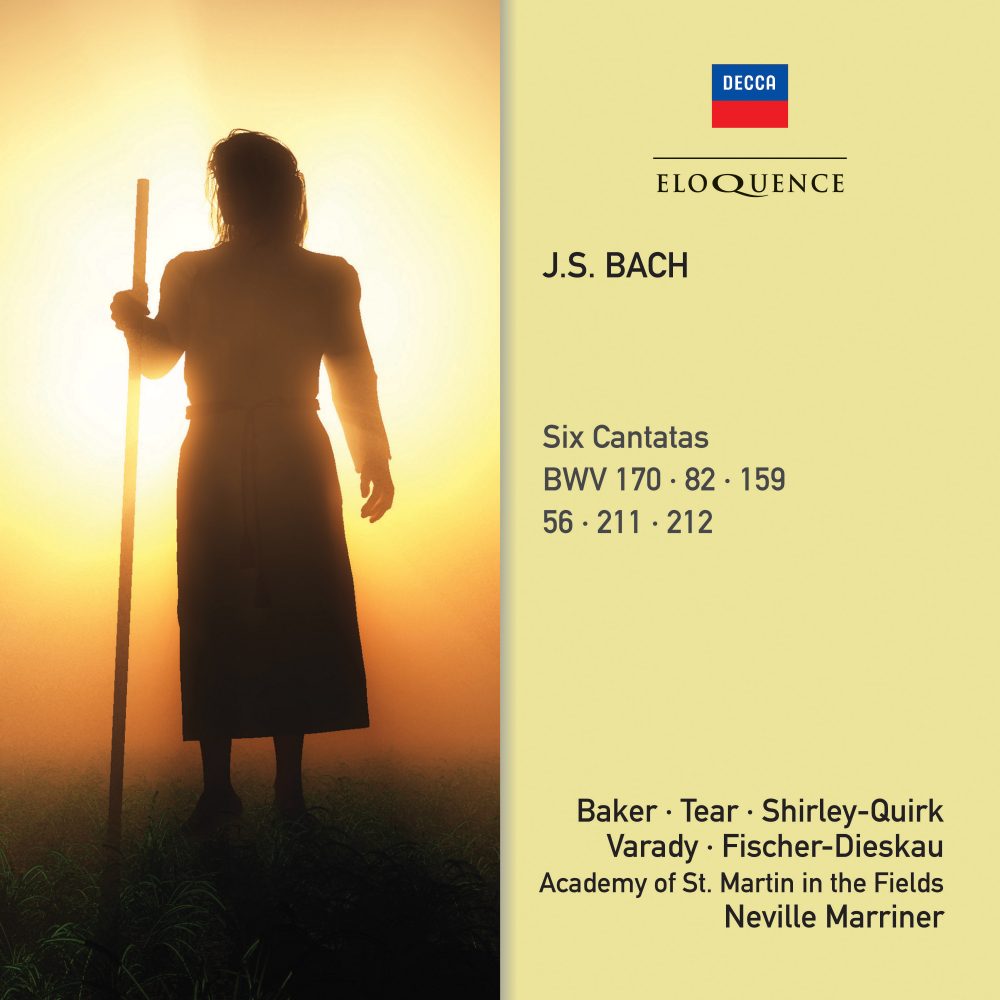The complete Philips and L’Oiseau-Lyre recordings of Bach cantatas made by Sir Neville Marriner, reissued together for the first time.
Bach’s cantatas vary enormously in scale and style, ranging from festal works featuring elaborate choral movements and large instrumental ensembles including trumpets and drums, to more meditative cantatas for a single voice and only a handful of instruments. The six examples gathered in this new Eloquence reissue tend towards the latter, more intimate vein of expression but they also encompass stylistic poles defined by varying purposes as either a sacred exposition of Scriptural principles or a rollicking secular entertainment.
The Academy of St. Martin in the Fields was not yet five years old when, in April 1964, it was joined by John Shirley-Quirk in St. Paul’s, Knightsbridge, to record the two most renowned cantatas for solo bass voice. Both ‘Ich will den Kreuzstab gerne tragen’ and ‘Ich habe genug’ rank among the composer’s most profound contemplations of mortality and singers of every voice-type have wished to put their personal stamp on them. Reviews at the time praised Shirley-Quirk’s assured legato as well as his affecting identification with Bach’s acutely sensitive response to text.
A little under two years later, the Academy and Shirley-Quirk made a sequel album, featuring another pair of much-loved English singers, Robert Tear and Dame Janet Baker. In ‘Vergnügte Ruh’ Baker sings hauntingly of the soul’s longing for death but to Shirley-Quirk is allotted the prize of ‘Es ist vollbracht’ in ‘Sehet, wir gehn hinauf gen Jerusalem’, one of the most expressive arias Bach ever wrote.
Dating from the early digital era, a pair of fun, sometimes satirical secular cantatas features the husband-and-wife team of Dietrich Fischer-Dieskau and Julia Varady, well placed to make the most of Bach’s underrated sense of humour and as ever accompanied by playing of natural and unaffected style from the Academy and Marriner.
JOHANN SEBASTIAN BACH
CD 1
Cantata ‘Vergnügte Ruh’ beliebte Seelenlust’, BWV 170
Janet Baker, mezzo-soprano
Cantata ‘Ich habe genug’, BWV 82
John Shirley-Quirk, bass
Cantata ‘Sehet, wir gehn hinauf gen Jerusalem’, BWV 159
Janet Baker, mezzo-soprano
Robert Tear, tenor
John Shirley-Quirk, bass
St. Anthony Singers
CD 2
Cantata ‘Ich will den Kreuzstab gerne tragen’, BWV 56
John Shirley-Quirk, baritone
St. Anthony Singers
Cantata ‘Schweigt stille, plaudert nicht’ (Coffee Cantata), BWV 211
Julia Varady, soprano
Aldo Baldin, tenor
Dietrich Fischer-Dieskau, bass
Cantata ‘Mer hahn en neue Oberkeet’ (Peasant Cantata), BWV 212
Julia Varady, soprano
Dietrich Fischer-Dieskau, bass
Academy of St. Martin in the Fields
Neville Marriner
THE COLLECTED NEVILLE MARRINER RECORDINGS OF BACH CANTATAS FOR DECCA & PHILIPS
Recording Producers: Erik Smith (BWV 159, 170, 211, 212); James Burnett (BWV 56, 82)
Recording Engineers: Hans Lauterslager (BWV 211, 212); Allen Stagg (BWV 56, 82); unidentified (BWV 82, 159, 170)
Recording Locations: St. Paul’s, Knightsbridge, London, UK, 28–29 April 1964 (BWV 56, 82); Decca Studios, West Hampstead, London, UK, 29 & 31 January 1966 (BWV 159, 170); Henry Wood Hall, London, UK, 18–20 November 1981 (BWV 211, 212)
Original LP Releases: L’Oiseau-Lyre OL (SOL) 280 (BWV 56, 82); L’Oiseau-Lyre OL (SOL) 295 (BWV 159, 170); Philips 6514 213 (BWV 211, 212)
PENGUIN ROSETTE AWARD: Cantatas BWV 170, 82, 159
‘Shirley-Quirk has a dark voice of considerable beauty, and in BWV 56 he produces a good deal of lyrical, poetic singing.’ High Fidelity, February 1966
‘Shirley-Quirk does some fine lyric singing [in BWV 159] and Miss Baker is in top form. She is equally impressive in BWV 170 … and the sound is first-rate.’ High Fidelity, May 1967
‘There’s plenty of rollicking fun in these new performances of Bach’s most secular of secular cantatas… The slender story is played for all it’s worth. Aldo Baldin is a fine narrator, Julia Varady a defiant daughter, and Dietrich Fischer-Dieskau a magnificently heavy-handed, and heavy-footed, father.’ Gramophone, February 1983 (BWV 211)

